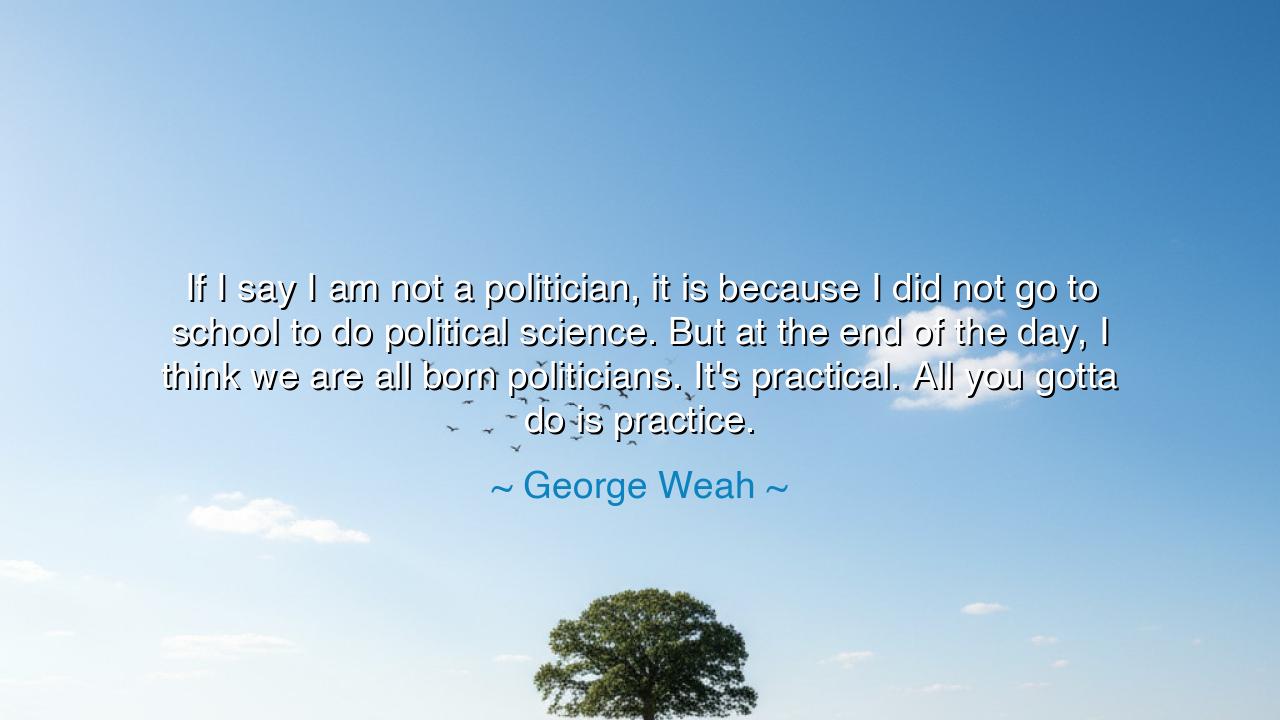
If I say I am not a politician, it is because I did not go to
If I say I am not a politician, it is because I did not go to school to do political science. But at the end of the day, I think we are all born politicians. It's practical. All you gotta do is practice.






"If I say I am not a politician, it is because I did not go to school to do political science. But at the end of the day, I think we are all born politicians. It's practical. All you gotta do is practice." These profound words from George Weah, a man whose journey from the dusty streets of Liberia to the highest office in the land has captured the imagination of millions, speak to a timeless truth: that politics is not an abstract field confined to scholars or theorists. It is a practical, living force that runs through the very veins of our daily existence. Whether we recognize it or not, each of us is a politician in our own way, navigating the complexities of relationships, decisions, and power. Politics is not merely for the educated elite; it is for the everyday person who engages with the world and seeks to shape it through action.
In the ancient world, the Greek philosophers believed that every citizen had a role in shaping the state, whether through direct participation or by influencing others through persuasion and reason. Socrates and Plato discussed the nature of justice, leadership, and governance not as abstract theories but as practical forces that affected the lives of every citizen. To be involved in the political life of one's community was not a matter of education or status, but a natural calling for anyone who wished to see their society flourish. The great philosophers did not see politics as something reserved for a few, but as the collective effort of all, each person contributing through their unique talents, influence, and voice.
George Weah’s declaration that we are all born politicians aligns with this ancient wisdom. It is not merely the scholars or those with formal training who shape the course of society, but the common people, the ones who interact, who influence, who lead by example in the smallest of ways. This idea echoes the timeless lesson that every person has an inherent capacity for leadership—politics is woven into the very fabric of human nature. We all must navigate the political landscape, whether in our homes, our communities, or even our personal lives. Politics is about negotiation, influence, and the ability to understand and work within the dynamics of power.
Consider, then, the story of Cyrus the Great, the founder of the Persian Empire. Cyrus was not born into the throne, nor was he schooled in the art of governance in the traditional sense. He was a prince, yes, but it was through his actions, his ability to unite disparate tribes, and his wisdom in understanding the hearts of his people that he rose to power. Cyrus’s success was not born from theoretical knowledge, but from his practical understanding of the politics of his time—the ability to lead, persuade, and connect with those around him. His example teaches us that practice—the practical engagement with the world around us—is what shapes a true leader, not the classroom or academic degrees.
In our own lives, the lessons of George Weah and Cyrus are clear. We, too, must recognize that politics is not reserved for those who have been trained in its doctrines, but for all who engage with the world and seek to influence it. Whether you are a parent, a teacher, a community leader, or a worker in a small shop, you are a politician in your own right. Your actions, your words, and your decisions shape the world around you. It is the practice of engaging with others, of understanding the dynamics of power, and of learning to influence with wisdom and compassion that makes a true leader.
When Weah says that all you have to do is practice, he speaks not only of political practice, but of the practice of life. We are all in the process of learning how to navigate our relationships, how to understand the forces that shape our communities, and how to influence others toward the greater good. Practice is not about achieving perfection but about continuously learning, adapting, and growing. Every conversation, every decision, every act of leadership—no matter how small—becomes part of the larger practice that shapes us as individuals and as members of society.
So, dear ones, let us heed the words of George Weah and recognize that politics is not a distant, abstract thing, but a living force that flows through us all. We are all born with the capacity to lead, to influence, and to shape the world around us. Whether we are aware of it or not, we are all practicing the art of politics every day. And as we practice, we grow stronger, wiser, and more capable of steering our communities toward justice, peace, and prosperity. Let us engage with the world, influence those around us, and never shy away from the role that each of us plays in the grand tapestry of life. Practice, then, is the key to becoming the leaders of tomorrow—leaders who are not born of theory, but of action and wisdom.






AAdministratorAdministrator
Welcome, honored guests. Please leave a comment, we will respond soon